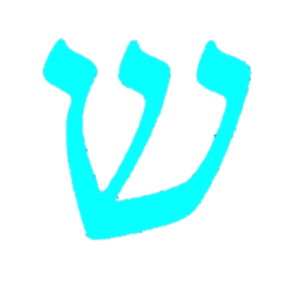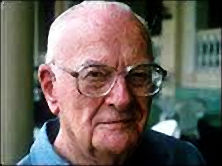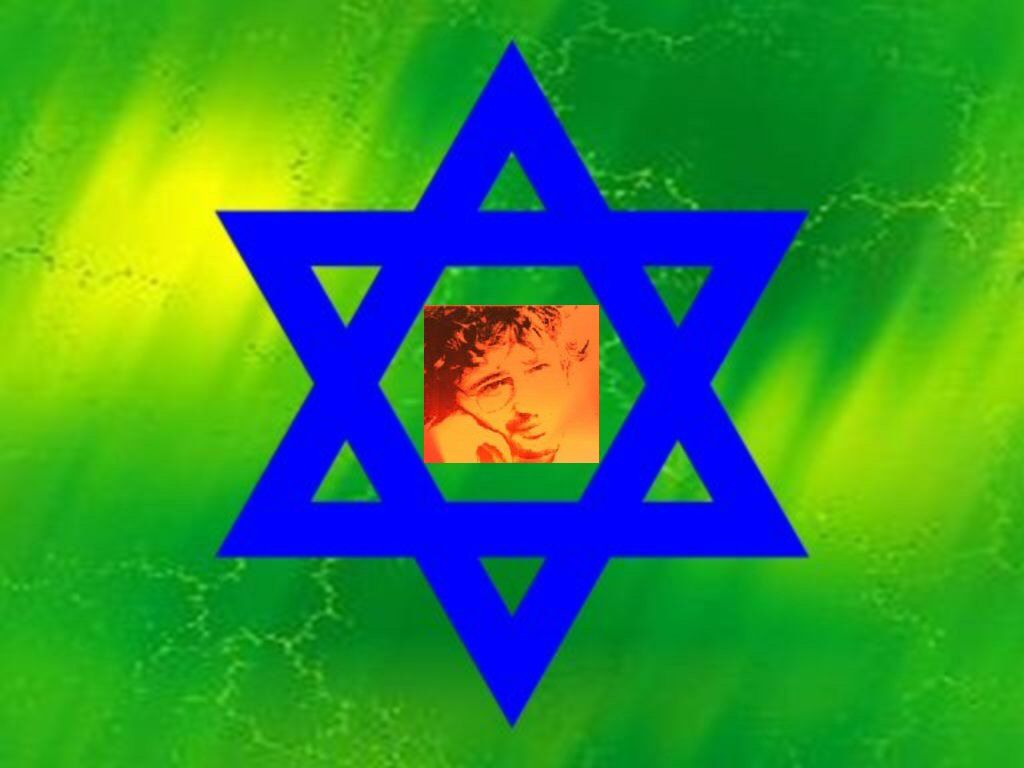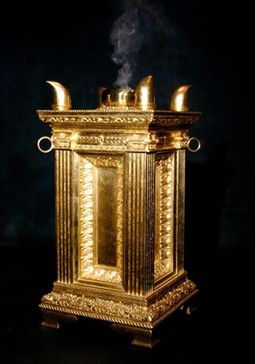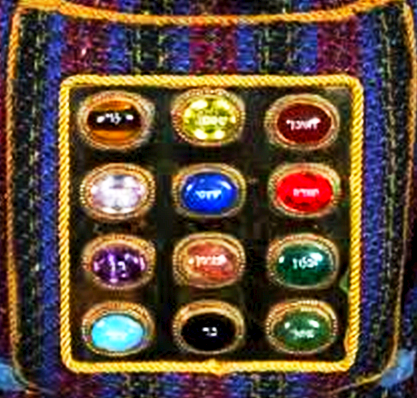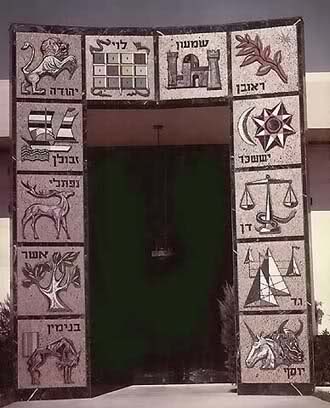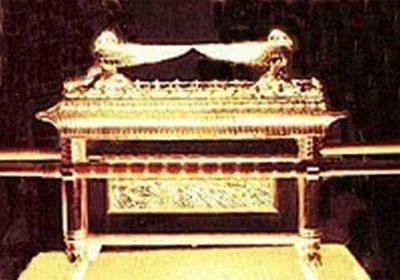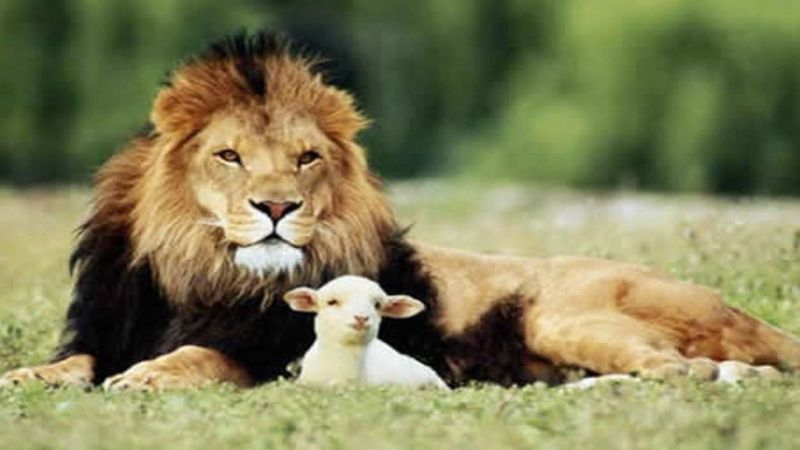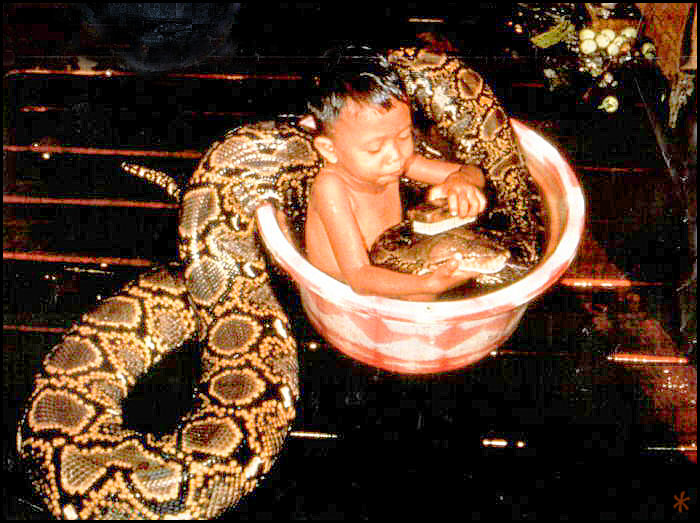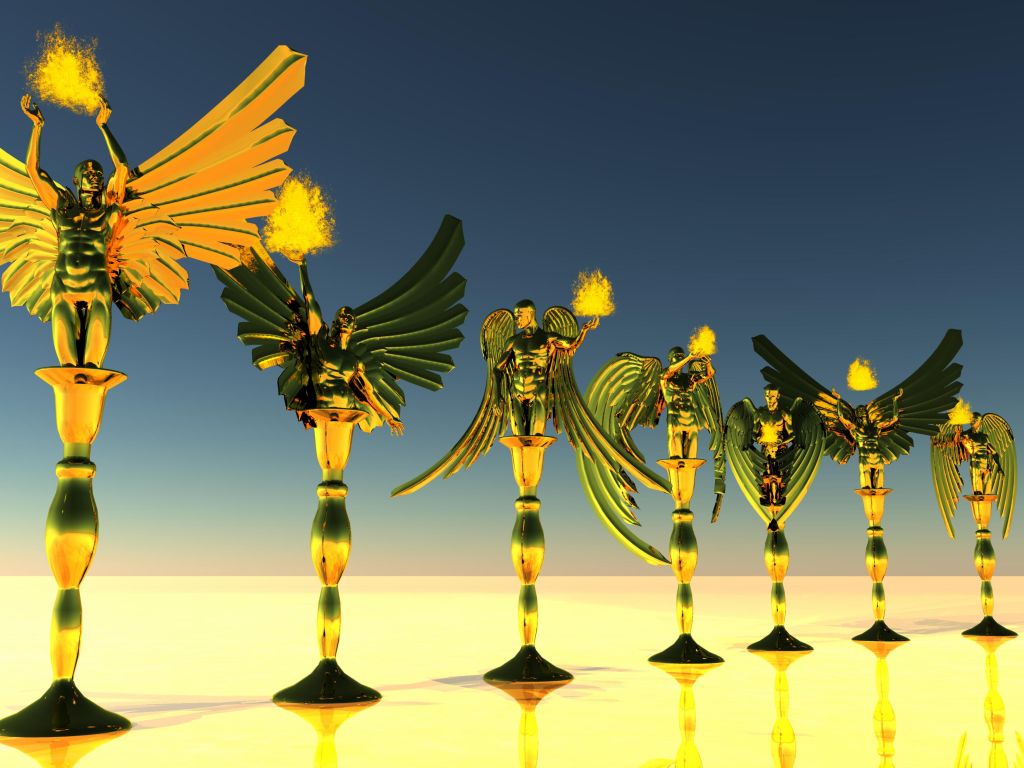Kabbalah Reading (Jewish Metaphysical Wisdom)
Posted by Oliver Oyanadel on December 16, 2014, 7:15 pm
Edited by board administrator January 13, 2015, 6:15 am
|
Rabbi Hamnuna-Saba then said as follows: “Do not let your mouth cause
your body to sin,” i.e., one must not allow his mouth to get close to evil and be
the cause of sin for the sacred flesh, which bears the mark of the holy covenant
with the Creator. If he does so, he shall be dragged to hell. And the ruler of
hell, called Domeh, stands at the gates of hell with hundreds of thousands of
angels, but he is forbidden to approach those who have kept the holy covenant
in this world.
There is a warning here: let each man be careful of what he utters, so that
his prayer is pure when he raises MAN with the help of the Torah and Mitzvot.
If the impure force clings to his prayer, it will receive his MAN. As a result,
man will develop a grudge against the Creator and foreign thoughts, thereby
causing the Orlah to once again cling to the holy covenant. Consequently,
his holy soul will fall into the captivity of the impure forces, and they will
drag it to hell. This is similar to what Rabbi Elazar said about falling into
Lilit’s hands (item 68).
THE SACRED FLESH, WHICH BEARS THE MARK OF THE HOLY
COVENANT alludes to the holy soul guarded by the holy covenant, as it is said:
“From my flesh I shall see the Creator,” i.e., from my nature, my properties. Yet,
doubts evoke the return of the impure force of the Orlah. It touches the holy
covenant, and the Divine soul is instantly driven away. Hence, “The Tree cried
out: Sinner, do not touch me,” for this Tree is Yesod, Ateret Yesod (foreskin—the
very essence of creation, egoism), the Tree of Knowledge of Good and Evil.
DOMEH, THE RULER OF HELL—DOMEH is derived from Dmamah—
lifelessness, for he robs man of his soul and leaves him lifeless. This is the angel
that fills man’s heart with doubts regarding the Creator’s greatness, and creates
within him a sinful desire to perceive His plans as though they were plans of one
born of a woman, i.e., as though they were of this world. And since he likens the
Creator’s thoughts in man’s perception to those of man, he is named so (Domeh
also means likeness, similarity).
At first, man understands that the Creator’s thoughts and ways are different
from ours, for the created mind can grasp neither Him nor His thoughts nor
His governance, as our mind is inferior to His. But, through sin, the angel
Domeh plants a silly spirit within man, which forces him to say that the mind
of one born of a woman is similar to the Creator’s. This leaves man open to
doubts, which DRAG HIM TO HELL.
290 THE ZOHAR
Therefore, the power of the angel Domeh is in his name, as it is said: “Who
is as mighty as You, who is LIKE You, the King that kills and resurrects?” This
indicates that the connection with the one who is LIKE him leads to death,
whereas in the realization that there is none like Him, man finds life.
However, the doubts and thoughts that man receives from the angel Domeh
are countless, as The Zohar says, HUNDREDS OF THOUSANDS OF ANGELS
ARE WITH HIM, and they are all standing at the gates of hell, through which
man is dragged there, though the gates themselves are not yet considered hell.
BUT HE (THE ANGEL) IS FORBIDDEN TO APPROACH THOSE
WHO HAVE KEPT THE HOLY COVENANT IN THIS WORLD. And even if
one did not fully keep (observe) the covenant, and there is still good and evil in
his deeds, he is nonetheless regarded as one who has kept the holy covenant. So,
unless one comes to doubt, the angel Domeh is forbidden to drag him to hell.
132. When this happened to King David, fear enveloped him. Right then,
Domeh ascended before the Creator, and said: “Master of the world, it says in
the Torah (Vayikra, 20:10): ‘And the man that commits adultery with another
man’s wife…’ David broke his covenant, is it not so?” The Creator replied to
him: “David is righteous, and his holy covenant remains pure, for it is known
to Me that Bat Sheva was destined for him since the creation of the world.”
Although David committed no sin, as the Talmud explains (Shabbat, 56:1) that
he who says that David sinned is wrong, he was enveloped with fear nonetheless,
as if he really had sinned, for Domeh cited the Torah in his complaint.
However, Bat Sheva had been destined for David since the creation of the
world (Talmud, Sanhedrin, 107:1); thus, he did not violate his covenant. Yet, if Bat
Sheva had been destined for David, why was she first married to Uriah? After all,
a wife is half of her husband’s body. And if she is half of David’s body, how could
Uriah have taken her, if there is nothing in him that corresponds with her?
The fact is that Bat Sheva is David’s true Nukva (female) from the day of the
creation of the world, for David is the male part of Malchut, while Bat Sheva
is the Nukva in Malchut. But since, as the world was being created, Malchut
ascended to Bina to receive the property of mercy (bestowal) from her, Bat Sheva,
too, required this correction in GAR. Without it she could not have given birth
to the soul of King Solomon.
And Uriah the Hittite was an exalted soul, the properties of GAR, wherefrom
the name “Uriah,” which consists of Ur = Ohr (Light) and i(a)h = i (Yod) + h (Hey) =
the first two letters of the Creator’s Name HaVaYaH, is derived. In other words,
Uriah signifies “the Creator’s Light.” And the fact that his name contains only
THE NIGHT OF THE BRIDE 291
the first two letters Yod-Hey = Hochma-Bina, and lacks the last two letters Vav-
Hey = ZA-Malchut indicates that his Light is the Light of GAR. Therefore, to
correct Bat Sheva in the property of mercy, she was joined with Uriah. As a
result, she became fit for queenship, and became the Queen of Israel.
133. Domeh said to Him: “Master of the World, what is revealed to You is
concealed from him.” The Creator answered: “Whatever David did was done
with My permission. For no man goes to war without first giving his wife a get
(document of divorce).” Domeh then said: “But if this is so, David should have
waited three months, which he did not.” The Creator replied: “This extension
is only necessary to make certain that the woman is not pregnant from her
previous husband. But it is known to Me that Uriah never went near her, for
My Name is imprinted in him as testimony. Indeed, Uriah is Ohr-Iah, the
Creator’s Light, though it is written Uriahu = Ohr + i + a + hu (Yod-Hey-Vav),
without the last Hey, Malchut, which proves that he did not use Malchut.”
The letters Yod-Hey in Uriah’s name (Aleph-Reish-Yod-Hey) indicate that he
had never touched Bat Sheva. This is because Uriah refers to GAR without
VAK. And The Zohar emphasizes that whenever VAK is used, the name Uriahu
is applied. However, it is written here that Uriah was Bat Sheva’s first husband,
meaning that he had nothing of VAK in him, but only GAR—the Light of Hochma
without the Light of Hassadim, for Vav signifies Hassadim. This is why he could
not come near Bath Sheba.
134. Domeh said to Him: “Master of the World, this is exactly what I have
said: if You knew that Uriah had never laid with her, then who revealed it to
David? He should have waited three months. And if You will say that David
knew that Uriah had never laid with her, why did he send Uriah to his wife,
saying: ‘Go down to your house, and wash your feet?’”
Usually the readers of the Torah give this example of “a love triangle” as
evidence of King David’s less than exalted qualities and of the inconsistency of
the Creator’s judgment—how He forgave David for “killing” Uriah, and so forth.
We must remember that the Torah speaks only of the spiritual worlds and their
laws, which have no obvious consequences in our world. There is a cause-andeffect
connection: whatever occurs in our world is a result of a Higher cause, but
in no way is it vice versa, i.e., whatever is described in the Upper World does not
necessarily need to manifest in ours. To consider the Torah a narrative about
our world relegates the Torah of the world of Atzilut, the Creator’s holy names,
the Creator’s Light, to the lowest level of creation, which is strictly forbidden:
“Do not make an idol for yourself.”
292 THE ZOHAR
135. He replied to him: “Of course, David did not know, but he waited more
than three months, as four months had passed.” As we have learned, on the
15th day of Nissan, David ordered all the people of Israel to prepare for war,
Yoav—on seventh day of Nissan. They conquered the lands of Moav and
remained there for four months, until he went to Bat Sheva in the month
of Elul. And on Yom Kippur, the Creator forgave him his sin. But there are
those who say that David dispatched his orders on the seventh day of Adar,
the troops assembled on the 15th day of Iyar, he went to Bat Sheva on the
15th day of Elul, and on Yom Kippur the Creator forgave him and spared him
from death at the hands of the angel Domeh.
Domeh is in charge of adultery. And since David was forgiven on the Day of
Atonement, he thereby escaped death at the hands of Domeh. However, death
was a consequence of Uriah’s death at the hands of Amon’s sons, as is recorded
in the book of Kings (Melachim, 1, 15:5), “For David did that which was right in
the eyes of the Lord, and turned not aside from anything that He commanded
him all the days of his life, save only in the matter of Uriah the Hittite.”
136. Domeh said: “Master of the World, I have nonetheless one claim
against him: why did he open his mouth and say: ‘The Lord is righteous,
for a mortal does so,’ thus condemning himself to death. Hence, I have the
power to bring death upon him.” The Creator replied to him: “You are
not allowed to bring death upon him, for he has repented and confessed: ‘I
have sinned before the Creator,’ even though he did not sin. But he did sin
in one matter—the killing of Uriah. I have recorded his punishment, and
he had received it.” Then Domeh immediately gave up his complaints, and
returned, despondent, to his place.
The last letter Hey in the name HaVaYaH has two points—restriction
(strictness) and mercy. And all the corrections of Malchut with the help of the
covenant (circumcision) are intended to conceal strictness and reveal mercy.
Then, the Creator’s name descends into Malchut. Even though Malchut exists
there under the ban of the first restriction (strictness and judgment), and all
the impure forces cling onto her, this point is nonetheless concealed, and only
Bina’s property of mercy is revealed. Thus, the impure forces-desires, which are
foreign to holiness and spirituality, are powerless and cannot cling to her.
To violate the covenant means to reveal the strictness and judgment in
Malchut (the letter Hey). As a result, the impure forces immediately cling to her, for
this is their property—a part of them. The holy soul, the Creator’s name, thereby
disappears at once, as it is written (Iyov, 4:9): “By the breath of God they perish.”
THE NIGHT OF THE BRIDE 293
David himself is the part of Malchut related to Malchut’s property of mercy.
Hence, he requires special care so as to prevent Malchut’s property of strictness
from being revealed in him. For he who reveals the property of strictness and
violates the covenant with the Creator, surrenders himself to the impure forces,
which condemn him to death. This is because the property of strictness reveals
itself within him before the impure force (the angel Domeh), who wished to
cling to David’s soul and drag it to hell.
Although he was innocent, David begged the Creator’s forgiveness for adultery,
and received it. But with regard to David sending Uriah to his death, Domeh had
no right to ask the Creator for punishment, as he is only in charge of adultery.
137. And David said to this: “Were it not for the Creator’s help, Domeh had
nearly claimed my soul.” “Were it not for the Creator’s help” means “had the
Creator not been my guard and guide against the angel Domeh.” “Nearly”
means that only the distance as thin as a thread remained for Domeh to drag
my soul to hell.
David is Malchut, of whom it is written (Mishley, 5:5): “Her feet descend to
death,” for she is the end, conclusion of holiness (the spiritual). The impure
forces originate in Malchut, and she sustains them, as it is said (Tehilim, 103:19):
“His kingdom rules over all.”
However, when Malchut exists in her corrected property of mercy (item 122),
she is defined as consisting of two points: her own point of judgment and the
point of mercy that she received from Bina. Her point of judgment is concealed,
while the point of mercy is revealed. And thanks to this correction, all that the
impure forces can get from Malchut is a Ner Dakik (tiny luminescence), which
only sustains their existence, but does not allow for their spreading.
Ner Dakik, the source of existence for the impure forces, is also known as
Hoteh Dakik, a small sin, the root of sins, as it is written (Talmud, Sukkah, 52:1):
“Initially, the impure force seems as thin as a spider web, but then grows as
thick as a shaft.” And it is called small (Dakik), for judgment and restrictions are
concealed within the property (point) of mercy.
However, he who violates the covenant causes the point of judgment in
Malchut to be revealed. As a result, the impure forces cling to Malchut and draw
much Light from her, thus receiving the strength to spread and expand. And he
who does so is said to be forsaking his own soul, as it is written: “By the breath
of God they perish” (Iyov, 4:9).
And when he merits returning to the Creator, he returns and corrects
Malchut with the property of mercy. This is why this process is called Teshuva
294 THE ZOHAR
(return), from the word of Tashuv (to return) + “A,” where “A” (Hey) designates
the Creator. In other words, it is the return to the property of mercy, whereas
the property of judgment goes back to being concealed in the property of mercy,
like a small candle, and nothing more.
It is therefore written: WERE IT NOT FOR THE CREATOR’S HELP,
referring to His acceptance of my return and repelling the angel Domeh by
bringing Malchut back to her place (to the property) of mercy, reducing the
property of judgment to a mere small candle, a hair’s-breadth fire, whose LIGHT
SEPARATES ME FROM THE IMPURE FORCE.
This is that minimal Light that must always remain between Malchut and
the impure force, so as to allow Malchut to exist and be sustained by this small
Light, called “small sin,” so small that DOMEH WOULD NOT DRAG MY
SOUL TO HELL FOR IT.
It is precisely the magnitude of this Light that saved me from the hands
of Domeh, for had the property of judgment not returned to Malchut in the
measure of a small sin, I would have fallen into the hands of Domeh.
138. Therefore, man should be careful not to say what David said, for one
cannot say to the angel Domeh that “It was an error” (Kohelet, 5:5), as it was
with David, when the Creator won the dispute against Domeh. “Why should
the Creator be angry over your word” (Kohelet, 5:5), i.e., for what you have
said. “Destroyed the work of your hands” (Kohelet, 5:5) i.e., the sacred flesh,
the holy covenant, which you have broken, and are therefore to be dragged to
hell by the angel Domeh.
There are two ways to return to the Creator (“Introduction to the Study of
the Ten Sefirot,” items 45, 59, 64; Talmud, Yoma, 86:2):
1) Repentance out of fear, when intentional sins become unintentional,
2) Repentance out of love, when intentional sins become merits.
Before the end of correction, when the forces of strictness, restriction, and
judgment are still needed in the world, as it is written (Kohelet, 3:14), “The
Creator hath so made it that man should fear Him,” Malchut must sustain the
existence of the impure forces as Ner Dakik, so they will not disappear from
the world.
Therefore, at such a time (in this state), Malchut’s corrections are made in
two points: mercy and judgment. However, judgment is concealed, while mercy
acts openly. This is why the Tree of Knowledge of Good and Evil is feared: if
man is worthy—it is good, if not—it is evil (items 120–124).
THE NIGHT OF THE BRIDE 295
Therefore, DURING THE 6,000 YEARS, WE RETURN TO THE
CREATOR ONLY OUT OF FEAR, which causes our intentional sins to turn
into unintentional ones—errors. As a result of our repentance, we bring Malchut
back to the property of mercy. But strictness and judgment are concealed in her
to the extent of a small candle (small sin), since Malchut must still remain in the
property of fear. Hence, this return is called “the return out of fear.”
The small sin that must remain is also called “unintentional sin,” an “error,”
a “mistake,” for it is not regarded as a sin in and of itself. Rather, it only leads
man to commit an unintentional sin. Man sins intentionally only after having
first committed an unintentional sin: he committed something unintentionally,
but it turned out that he has sinned.
Thus, this small sin remains in Malchut, but although it remains, it is not
really considered a sin. Yet, through this concealed judgment and strictness
we come to intentional sins. This is why it is said: “Initially, it is as a hair’sbreadth,”
i.e., like a small sin. But then, unless we properly guard our covenant,
it “becomes as thick as a shaft,” as the property of strictness and judgment
becomes revealed in Malchut.
It is hence said that Domeh stands at the gates of hell, as the power of a
small sin is only an entrance, for it is said that it looks as thin as a spider web.
Therefore, our repentance is called “forgiven sins,” which turn into unintentional
errors, as though they were mistakes. For a small sin remains, which is capable
of leading us to intentional sins.
All this refers to the repentance out of fear, whereas the second kind is the
repentance out of love, when intentional sins turn to merits (item 126).
Therefore, MAN SHOULD BE CAREFUL NOT TO SAY WHAT DAVID
SAID, i.e., not to utter the word that causes the property of judgment in Malchut
to be revealed (as David had done). FOR ONE CANNOT SAY TO THE ANGEL
DOMEH THAT IT WAS AN ERROR, for he is unsure as to whether he can
return to the Creator right away, so that his sin would be forgiven and made
unintentional, AS IT WAS WITH DAVID, WHEN THE CREATOR WON
THE DISPUTE AGAINST DOMEH.
It happened with David because throughout his life all of his actions before
the Creator were pure, he had committed no crimes, and the only exception was
his act toward Uriah. Hence, the Creator became his defender, and helped him
return to Him at once, and his sin was turned into an error, as it is said in The
Zohar (item 137): WERE IT NOT FOR THE CREATOR’S HELP, DOMEH
296 THE ZOHAR
HAD NEARLY CLAIMED MY SOUL. But other people should fear this angel,
for an unintentional sin may lead them to hell at the hands of Domeh.
DESTROYED THE WORK OF YOUR HANDS, THE SACRED FLESH,
THE HOLY COVENANT, WHICH YOU HAVE VIOLATED, AND ARE
THEREFORE TO BE DRAGGED TO HELL BY THE ANGEL DOMEH.
The correction in us called “the holy covenant” is regarded as “the work of
our hands,” as it is written: “Confirm the work of our hands.” The holy soul
is called the sacred flesh, as it is said, “Out of my flesh shall I see the Creator”
(Iyov, 19:26) (item 131). Because of the revelation of the property of strictness
and judgment in Malchut, the correction of the covenant was corrupted, and
Domeh drags the soul to hell.
Therefore, THE HEAVENS DECLARE THE WORK OF HIS HANDS
(item 130). In the end of correction, the Heavens will declare the work of His
hands, as the reward for all these corrections will be revealed. It will become
clear that this was THE WORK OF HIS HANDS, and NOT OURS’, and THE
HEAVENS DECLARE this. And the great Zivug RAV PAALIM U MEKABTZIEL
will be made on these actions (corrections) (item 92). DECLARE refers to the
Light’s descent from Above.
Know that this is the only difference in our world before and after the end of
correction. Before the end of correction, Malchut is called the Tree of Knowledge
of Good and Evil, for Malchut is the revelation of the Creator’s governance over
this world. And until people achieve the state where they can receive His Light
(as He conceived and prepared for everyone back at the Thought of Creation),
the world will be ruled by good and evil, by reward and punishment.
The reason for this is that our Kelim de Kabbalah (vessels of reception) are
impure, stained by egoism, which (i) prevents the Creator’s Light from filling
theses desires, and (ii) separates us from the Creator. And the infinite goodness
that He has prepared for us may only be received in altruistic desires, for these
delights are not limited by the bounds of creation, like egoistic pleasures, in
which fulfillment instantly douses the pleasure.
Hence, it is written: “The Creator hath made everything for His own glory”
(Mishley, 16:4), i.e., all the deeds in the world were initially created by Him
so that we could please Him. Therefore, people in our world are engaged in
things that are totally opposite from what they should be doing, according to the
purpose of their creation. After all, the Creator clearly states that He created the
world for Himself: “I have created it for My glory” (Yeshayahu, 43:7).
THE NIGHT OF THE BRIDE 297
Yet, we claim the exact opposite—that the whole world was created for us,
and we desire to swallow it whole, for our own pleasure, satisfaction, indulgence,
and exaltation. So it is no surprise we are unworthy of receiving the Creator’s
perfect goodness. And thus He rules over us through good and evil, in the
form of reward and punishment, for one depends on the other: reward and
punishment give rise to good and evil.
Because we use our desires to receive (pleasure), thus becoming opposite
from the Creator, we perceive His governance towards us as evil. This stems from
the fact that man cannot perceive obvious evil from the Creator, as this would
greatly undermine the creatures’ perception of the great and perfect Creator, for
the Perfect one cannot create evil.
Therefore, to the extent that man feels bad and evil, and denies the Divine
Providence, a veil immediately falls over him, and the sensation of the Creator’s
existence disappears. This is the worst punishment in the world!
Hence, the sensation of good and evil in the Creator’s governance gives us
a feeling of reward and punishment. This is because he who exerts efforts not to
lose faith in the Creator‘s existence and governance, even if he tastes evil in His
governance, is rewarded with finding strength to not lose faith in the governance
and good purpose of the Creator’s “evil” influence. But if he had not yet merited
the opportunity to exert efforts in believing that the Creator pursues a definite
purpose by sending him unpleasant sensations, he is punished with remoteness
from faith in the Creator and the sensation of His existence.
Therefore, although He has done, is doing, and will do all the deeds in the
world, it remains semi-concealed from those who perceive both good and evil.
For when they perceive evil, the impure force is allowed to conceal the Creator’s
governance and faith in Him. Thus, man suffers the worst punishment in the
world—the sensation of detachment from the Creator—and becomes filled with
doubts and denial of the Creator’s existence and governance. And when he
returns to the Creator, he receives a corresponding reward, and is able to unite
with Him once again.
But through this very governance of reward and punishment, the Creator
has prepared for us the opportunity to utilize this governance in order to achieve
the end of correction, when all people attain their corrected Kelim (desires), and
use them to bring pleasure to the Creator, as it is written that He has created
everything for Himself! In other words, our bestowal must be absolute.
Then the great Zivug of Atik will be revealed, we will all return to the Creator
out of love, all our intentional sins will turn to merits, all evil will be felt as
298 THE ZOHAR
infinite goodness, and His Divine Providence will be revealed in the entire
world. Thus, ALL SHALL SEE that only He has done, is doing, and will do all
the deeds in the world, and that no one acts besides Him. After the sensation of
evil and punishment is turned to one of goodness and reward, and our egoistic
desires become altruistic, we are given the opportunity to attain the Maker, for
we conform to the work of His hands by blessing and exalting Him above all evil
and all punishments we had once suffered.
|

